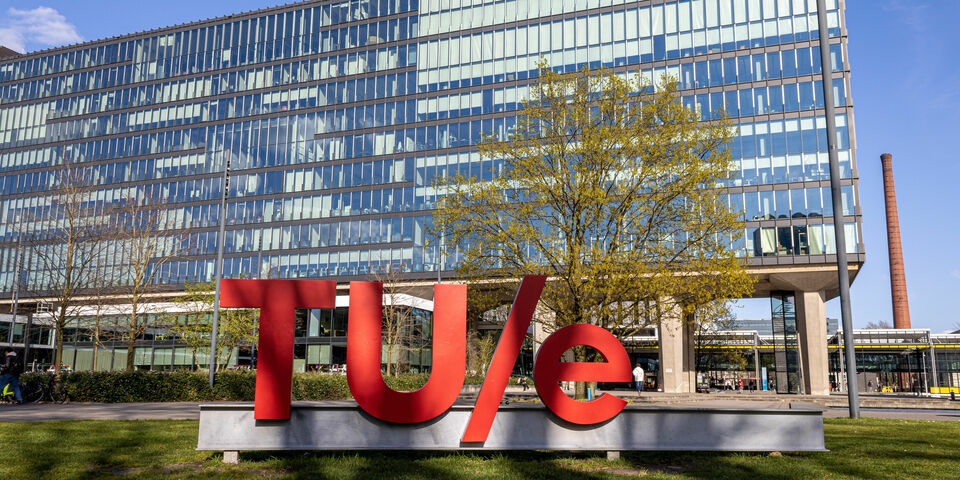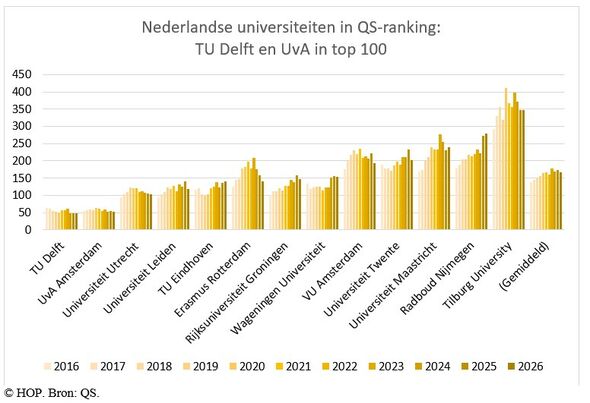Netherlands higher in global ranking, TU/e drops slightly
Nine of the thirteen Dutch universities are gaining ground in the world ranking of research agency QS. Frontrunners TU Delft and the University of Amsterdam maintain themselves around place 50. For the second year in a row, TU/e has dropped slightly in the QS world rankings.
The American MIT is once again number 1 in the new QS World University Rankings. Just like last year, the top 10 includes four American and four British universities. In places 7 and 8 are the Swiss ETH Zurich and the National University of Singapore.
Reputation
Over the years, Dutch universities have lost some ground in the rankings on average, although TU Delft and the University of Amsterdam have always scored well. But this year, nine of the thirteen universities have improved. For the second year in a row, TU/e has dropped slightly in the QS world rankings. Yet it is still ranked 5th among Dutch universities.
This year, TU/e is ranked 140th in the QS world rankings, compared to place 136th, 124th and 138th respectively in previous years. Despite this slightly lower score than previously, the ranking shows that the university scores consistently well, according to TU/e. "The QS ranking lists 1500 universities, and we are consistently in the top 10 percent," says spokesman Ivo Jongsma.
According to the makers, Dutch higher education scores best on average in Europe. But they do warn against the government's cutbacks and limiting the number of English-language programs.
The most important criterion of the ranking is the reputation of the university among scientists and employers, together accounting for 35 percent of the score. According to QS, the Netherlands scores many points with this. But in terms of citation scores (a measure of the influence of scientific articles), the Netherlands is slipping somewhat.
Criticism
There are more world rankings in circulation, such as the Shanghai Ranking and the ranking of the British Times Higher Education. The main criticism of such lists is that they create their own reality: how do you give a single score to an entire university, with all its staff and students? How big are the differences really?
TU/e also has its reservations about rankings, according to the spokesperson. "We are focused on performing our core tasks as well as possible and do not adjust our processes to get higher in rankings. At the same time, we recognize that the rankings play a role in the choices of international students, so we are happy that we are consistently in the top 10 percent."
Some institutions are trying to get higher on the lists in all kinds of ways. A university in Saudi Arabia, for example, paid (international) scientists to say they worked for it, so that their reputation was taken into account by that university.
The citation scores are also controversial. Research into the earthquakes in Groningen, for example, will attract little attention outside the Netherlands. Does that make it less valuable?
So there is often a call to ignore those rankings. Utrecht University no longer participates in it and no longer provides data. As a result, the university has disappeared from the competing ranking of Times Higher Education, but the QS ranking uses other sources. Just like last year, Utrecht is in third place among Dutch universities.
Two thoughts
On its website , university association UNL summarizes the criticism. The choices of ranking makers are arbitrary and debatable, is the position. So they want to give little weight to such lists.
Two years ago, an advice to the universities from their own 'expert group' stated that there should be a culture change so that universities do not make "opportunistic use" of rankings.
But the experts don't want to ignore the rankings completely either. "At the same time, this culture change must take place in a way that does not pose disproportionate risks to the reputation and brand awareness of universities," according to the advice.



Discussion